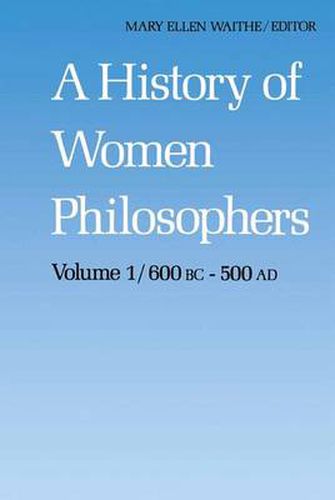Readings Newsletter
Become a Readings Member to make your shopping experience even easier.
Sign in or sign up for free!
You’re not far away from qualifying for FREE standard shipping within Australia
You’ve qualified for FREE standard shipping within Australia
The cart is loading…






This title is printed to order. This book may have been self-published. If so, we cannot guarantee the quality of the content. In the main most books will have gone through the editing process however some may not. We therefore suggest that you be aware of this before ordering this book. If in doubt check either the author or publisher’s details as we are unable to accept any returns unless they are faulty. Please contact us if you have any questions.
edited by Mary Ellen Waithe Series: HISTORY OF WOMEN PHILOSOPHERS volume: 3 From the 17th century onwards, increasing numbers of mostly self-educated women became philosophers. The philosophical writings of Anna Maria van Schurman, Margaret Cavendish, Anne Conway, Mary Astell, Catharine Trotter Cockburn, Damaris Cudworth Masham, Harriet Taylor Mill, Harriet Martineau, Margaret Fuller, Charlotte Perkins Gilman, Lou Andreas Salome, Germaine de Staehl, Sophie Germain, and Mary Sommerville were influential. Other philosophers, including Queen Kristina of Sweden, Sor Juana Inez de la Cruz, Julie Favre, Clarisse Coignet, Anna Tumarkin, Hortense Allart de Meritens, Sophie Bryant, and Hedwig Bender were less well known. But all demonstrate expertise in many areas of philosophy: epistemology, logic, aesthetics, metaphysics, ethics, political philosophy, philosophy of science, of psychology, of religion, and, of mathematics. They write on such diverse topics as the mystical and the paranormal, the nature of thought, of faith, of morality, of liberty, of logic, and, the rights of women. Together they manifest philosophy’s own transition from mysticism to logical positivism. Kluwer Academic Publishers, Dordrecht March 1991 344 pp. Hardbound Dfl.196.00 BrP.78.50 March 1991 344 pp. Paperback Dfl.71.00 BrP.28.50
$9.00 standard shipping within Australia
FREE standard shipping within Australia for orders over $100.00
Express & International shipping calculated at checkout
Stock availability can be subject to change without notice. We recommend calling the shop or contacting our online team to check availability of low stock items. Please see our Shopping Online page for more details.
This title is printed to order. This book may have been self-published. If so, we cannot guarantee the quality of the content. In the main most books will have gone through the editing process however some may not. We therefore suggest that you be aware of this before ordering this book. If in doubt check either the author or publisher’s details as we are unable to accept any returns unless they are faulty. Please contact us if you have any questions.
edited by Mary Ellen Waithe Series: HISTORY OF WOMEN PHILOSOPHERS volume: 3 From the 17th century onwards, increasing numbers of mostly self-educated women became philosophers. The philosophical writings of Anna Maria van Schurman, Margaret Cavendish, Anne Conway, Mary Astell, Catharine Trotter Cockburn, Damaris Cudworth Masham, Harriet Taylor Mill, Harriet Martineau, Margaret Fuller, Charlotte Perkins Gilman, Lou Andreas Salome, Germaine de Staehl, Sophie Germain, and Mary Sommerville were influential. Other philosophers, including Queen Kristina of Sweden, Sor Juana Inez de la Cruz, Julie Favre, Clarisse Coignet, Anna Tumarkin, Hortense Allart de Meritens, Sophie Bryant, and Hedwig Bender were less well known. But all demonstrate expertise in many areas of philosophy: epistemology, logic, aesthetics, metaphysics, ethics, political philosophy, philosophy of science, of psychology, of religion, and, of mathematics. They write on such diverse topics as the mystical and the paranormal, the nature of thought, of faith, of morality, of liberty, of logic, and, the rights of women. Together they manifest philosophy’s own transition from mysticism to logical positivism. Kluwer Academic Publishers, Dordrecht March 1991 344 pp. Hardbound Dfl.196.00 BrP.78.50 March 1991 344 pp. Paperback Dfl.71.00 BrP.28.50